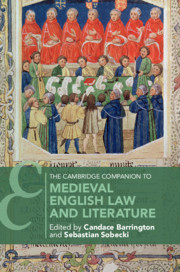Book contents
- The Cambridge Companion to Medieval English Law and Literature
- The Cambridge Companion to Medieval English Law and Literature
- Copyright page
- Contents
- Illustrations
- Contributors
- Abbreviations
- Preface
- Part I Legal Contexts
- 1 English Law before the Conquest
- 2 Languages and Law in Late Medieval England: English, French and Latin
- 3 Canon and Civil Law
- 4 Custom and Common Law
- 5 Magna Carta and Statutory Law
- 6 Treatises, Tracts and Compilations
- Part II Literary Texts
- Index
- References
6 - Treatises, Tracts and Compilations
from Part I - Legal Contexts
Published online by Cambridge University Press: 26 July 2019
- The Cambridge Companion to Medieval English Law and Literature
- The Cambridge Companion to Medieval English Law and Literature
- Copyright page
- Contents
- Illustrations
- Contributors
- Abbreviations
- Preface
- Part I Legal Contexts
- 1 English Law before the Conquest
- 2 Languages and Law in Late Medieval England: English, French and Latin
- 3 Canon and Civil Law
- 4 Custom and Common Law
- 5 Magna Carta and Statutory Law
- 6 Treatises, Tracts and Compilations
- Part II Literary Texts
- Index
- References
Summary
English law was influenced by many legal traditions: Anglo-Saxon, Danish, Frankish and Norman law and custom; feudal and seignorial law; borough customs, mercantile law and guild regulations; and Roman and canon law taught at English and continental universities. Common law became a recognisable legal system in the twelfth and thirteenth centuries, and the expansion of royal justice created a need for unofficial treatises, tracts and compilations in Latin and Anglo-Norman (Law French). These legal texts served a diverse readership of judges, lawyers, religious houses, prelates, landowners, manorial stewards, urban corporations, merchants and others needing legal knowledge. Commercial book production in Greater London and beyond resulted in a proliferation of legal manuscripts, from plain scribal copies for working lawyers to deluxe illuminated copies for high-status patrons. Supplementing these were manuscripts copied for their own use by lawyers, clerks and law students, especially after the rise of the Inns of Court from the 1340s. Scribal transmission of individually executed copies, usually written on parchment in varying grades of Anglicana script (an English book cursive of documentary origin) gave way from the 1480s to lawbook printing and publishing on paper.
- Type
- Chapter
- Information
- Publisher: Cambridge University PressPrint publication year: 2019



